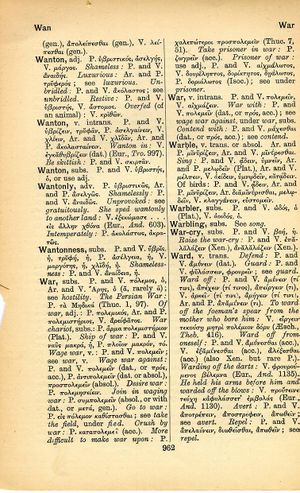ward: Difference between revisions
Στερρῶς φέρειν χρὴ συμφορὰς τὸν εὐγενῆ → Tolerare casus nobilem animose decet → Ertragen muss der Edle Unglück unbeugsam
(Woodhouse 5) |
(CSV5) |
||
| Line 1: | Line 1: | ||
{{ | {{Woodhouse1 | ||
| | |Text=[[File:woodhouse_962.jpg|thumb|link={{filepath:woodhouse_962.jpg}}]]'''v. trans.''' | ||
<b class="b2">Defend</b>: P. and V. ἀμύνειν (dat.). | |||
<b class="b2">Guard</b>: P. and V. φυλάσσειν, φρουρεῖν; see [[guard]]. | |||
<b class="b2">Ward off</b>: P. and V. ἀμύνειν (τί τινι), ἀπέχειν (τί τινος), ἀπείργειν (τι), V. ἀρκεῖν (τί τινι), ἀρήγειν (τί τινι), Ar. and P. ἀπαμύνειν (τι). | |||
<b class="b2">To ward off the foeman's spear from the mother who bore him</b>: V. εἴργειν τεκούσῃ μητρὶ πολέμιον [[δόρυ]] (Aesch., <b class="b2">Theb.</b> 416). | |||
<b class="b2">Ward off from oneself</b>: P. and V. ἀμύνεσθαι (acc.), V. ἐξαμύνεσθαι (acc.), ἀλέξεσθαι (acc.) (also Xen. but rare P.). | |||
<b class="b2">Warding off the darts</b>: V. φρουρούμενος βέλεμνα (Eur., ''And.'' 1135). | |||
<b class="b2">He held his arms before him and warded off the blows</b>: V. προὔτεινε τεύχη κἀφυλάσσετʼ ἐμβολάς (Eur., ''And.'' 1130). | |||
<b class="b2">Avert</b>: P. and V. ἀποτρέπειν, ἀποστρέφειν, ἀπωθεῖν; see [[avert]]. | |||
<b class="b2">Repel</b>: P. and V. ἀπελαύνειν, διωθεῖσθαι, ἀπωθεῖν; see [[repel]]. | |||
'''subs.''' | |||
<b class="b2">Protection</b>: P. and V. [[φυλακή]], ἡ. | |||
<b class="b2">Confinement</b>: P. [[φυλακή]], ἡ; see [[guard]]. | |||
<b class="b2">Put in ward</b>: P. εἰς φυλακὴν ποιεῖσθαι. | |||
<b class="b2">Watch</b>: P. and V. [[φυλακή]], ἡ, [[φρουρά]], ἡ, V. [[φρούρημα]], τό; see [[watch]]. | |||
<b class="b2">Division of a town</b>: P. [[κώμη]], ἡ; see [[quarter]]. | |||
<b class="b2">One left without parents</b>: use adj., P. and V. ὄρφανος, ὁ or ἡ. | |||
<b class="b2">Be a ward</b>, v.: use P. ἐπιτροπεύεσθαι. | |||
}} | }} | ||
Revision as of 10:09, 21 July 2017
English > Greek (Woodhouse)
v. trans.
Defend: P. and V. ἀμύνειν (dat.).
Guard: P. and V. φυλάσσειν, φρουρεῖν; see guard.
Ward off: P. and V. ἀμύνειν (τί τινι), ἀπέχειν (τί τινος), ἀπείργειν (τι), V. ἀρκεῖν (τί τινι), ἀρήγειν (τί τινι), Ar. and P. ἀπαμύνειν (τι).
To ward off the foeman's spear from the mother who bore him: V. εἴργειν τεκούσῃ μητρὶ πολέμιον δόρυ (Aesch., Theb. 416).
Ward off from oneself: P. and V. ἀμύνεσθαι (acc.), V. ἐξαμύνεσθαι (acc.), ἀλέξεσθαι (acc.) (also Xen. but rare P.).
Warding off the darts: V. φρουρούμενος βέλεμνα (Eur., And. 1135).
He held his arms before him and warded off the blows: V. προὔτεινε τεύχη κἀφυλάσσετʼ ἐμβολάς (Eur., And. 1130).
Avert: P. and V. ἀποτρέπειν, ἀποστρέφειν, ἀπωθεῖν; see avert.
Repel: P. and V. ἀπελαύνειν, διωθεῖσθαι, ἀπωθεῖν; see repel.
subs.
Protection: P. and V. φυλακή, ἡ.
Confinement: P. φυλακή, ἡ; see guard.
Put in ward: P. εἰς φυλακὴν ποιεῖσθαι.
Watch: P. and V. φυλακή, ἡ, φρουρά, ἡ, V. φρούρημα, τό; see watch.
Division of a town: P. κώμη, ἡ; see quarter.
One left without parents: use adj., P. and V. ὄρφανος, ὁ or ἡ.
Be a ward, v.: use P. ἐπιτροπεύεσθαι.

